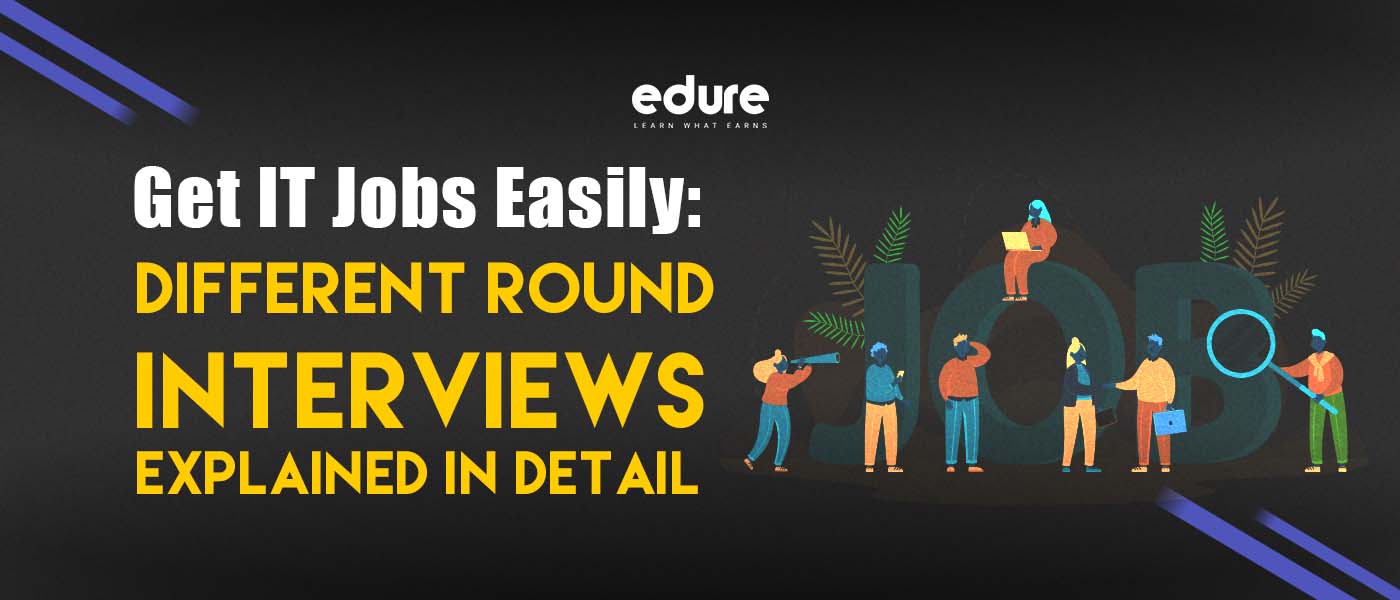In the dynamic landscape of Information Technology (IT), where innovation is constant and competition is fierce, securing the dream job often feels like cracking a complex code. Every aspiring IT professional embarks on a journey filled with anticipation, preparation, and the ultimate quest to crack the code of success in job interviews.
Imagine yourself as the protagonist in a high-stakes quest, equipped with the skills, knowledge, and determination to overcome any challenge that comes your way. In this exhilarating adventure, the key to unlocking the doors to your desired career lies in mastering the art of navigating the intricate maze of job interviews.
Welcome to the ultimate guide on cracking any IT job interview—a roadmap meticulously crafted to empower you with the strategies, insights, and confidence needed to emerge victorious in the competitive arena of IT recruitment. Whether you’re a seasoned developer, an aspiring data scientist, or a tech enthusiast ready to embark on your professional journey, this guide is your secret weapon to conquering the obstacles and grabbing the possibilities that await.
Join us as we delve into the depths of each interview stage, unraveling the mysteries behind aptitude tests, group discussions, technical rounds, and beyond. Together, we’ll decipher the hidden patterns, decode the unwritten rules, and uncover the secrets to standing out amidst a sea of talent.
Embark on this exhilarating journey with us, as we embark on a quest to crack the code and unlock the doors to your dream IT job. Let’s dive deep into the world of IT interviews, armed with knowledge, preparedness, and the unwavering determination to succeed. The adventure awaits—let’s begin the quest to crack any IT job interview! Learn more from Edure.
1. Aptitude Test:
Purpose: Aptitude tests are designed to assess your cognitive abilities, including problem-solving, critical thinking, numerical reasoning, and verbal abilities. The purpose is to gauge your potential to perform well in the role and within the organization.
Preparation: Practice regularly with sample aptitude tests available online or in books. Focus on improving your speed and accuracy in solving mathematical problems, logical reasoning, and understanding complex scenarios. Familiarize yourself with the format of the test to reduce anxiety on the actual test day.
Company Expectations: The company expects candidates to demonstrate strong analytical skills, logical reasoning, and the ability to think under pressure. They want to ensure that you possess the foundational skills necessary to excel in the role.
Interview Questions and Answers
2. Group Discussion:
Purpose: Group discussions evaluate your communication skills, teamwork, leadership potential, and ability to express your thoughts clearly and persuasively in a group setting. It also assesses your listening skills and your ability to build upon others’ ideas.
Preparation: Stay updated on current affairs and industry-related topics. Practice expressing your opinions confidently while being respectful of others’ viewpoints. Work on your body language, maintaining eye contact, and actively listening to others’ contributions.
Company Expectations: Companies look for candidates who can communicate effectively, collaborate with team members, and contribute positively to group dynamics. They want to see your ability to articulate ideas, persuade others, and work towards common goals.
Interview Questions and Answers
3. Written Test:
Purpose: Written tests evaluate your technical knowledge, problem-solving abilities, and attention to detail. These tests may include coding challenges, case studies, or scenario-based questions relevant to the role you’re applying for.
reparation: Review core concepts and technical skills relevant to the job description. Practice coding tasks on sites such as LeetCode, HackerRank, and CodeSignal. Pay attention to time management during the test, and ensure your solutions are well-structured and efficiently implemented.
Company Expectations: Companies expect candidates to demonstrate proficiency in relevant programming languages, algorithms, data structures, and problem-solving techniques. They want to assess your ability to apply theoretical knowledge to practical scenarios and deliver effective solutions.
Interview Questions and Answers
4. Technical Round:
Purpose: The technical round assesses your expertise in specific technical areas related to the job role. Interviewers may ask questions about your previous projects, problem-solving approaches, and technical challenges you’ve encountered.
Preparation: Review the job description to identify the key technical skills required. Refresh your knowledge of programming languages, frameworks, tools, and technologies mentioned. Be prepared to discuss your past experiences and provide examples of how you’ve solved technical problems.
company Expectations: Companies expect candidates to have a deep understanding of technical concepts relevant to the role. They want to assess your ability to solve real-world problems, adapt to new technologies, and collaborate effectively with colleagues.
By understanding the purpose of each interview round and adequately preparing for them, you can increase your chances of success in securing an IT job with placement.
Interview Questions and Answers
5. Interview Round:
Purpose: The interview round allows the hiring team to delve deeper into your qualifications, experiences, and fit for the role and the company culture. It’s an opportunity for them to assess your personality, communication skills, problem-solving abilities, and cultural fit within the organization.
Preparation: Reflect on your past experiences, achievements, and challenges faced in previous roles or projects. Practice articulating your career goals, strengths, weaknesses, and how you can contribute to the company’s success. Prepare thoughtful questions to ask the interviewer about the role, team, and company culture.
Company Expectations: Companies expect candidates to demonstrate a genuine interest in the role and the company. They want to assess your alignment with the company’s values, your ability to communicate effectively, and your suitability for the team dynamics.
Interview Questions and Answers
6. HR Round:
Purpose: The HR round focuses on evaluating your interpersonal skills, cultural fit, and overall suitability for the organization. HR representatives may discuss your career aspirations, compensation expectations, and any logistical considerations related to the role.
Preparation: Research the company’s culture, values, and employee benefits to understand what they offer and what you can expect. Prepare to discuss your career trajectory, motivations for applying to the company, and how you align with their culture and values.
Company Expectations: Companies expect candidates to exhibit professionalism, enthusiasm, and a positive attitude during the HR round. They want to ensure that you’ll be a good cultural fit within the organization and that your expectations align with what they can offer.
7. Manager Round:
Purpose: The manager round involves discussions with hiring managers or department heads who will assess your technical competence, leadership potential, and suitability for the team and project requirements.
Preparation: Familiarize yourself with the manager’s background, the team’s projects, and the specific challenges they face. Be prepared to discuss your technical skills, problem-solving abilities, and how you can contribute to the team’s success.
Company Expectations: Companies expect candidates to demonstrate a deep understanding of the role, the team’s objectives, and how they can add value. They also look for leadership potential, adaptability, and the ability to work well within the team structure.
8. Client Round:
Purpose: In some cases, particularly for client-facing roles or projects, candidates may need to undergo a client round where they interact with potential clients or stakeholders. This round assesses your communication skills, client management abilities, and your understanding of client needs.
Preparation: Research the client’s industry, business challenges, and expectations. Practice active listening, empathy, and clear communication to understand their requirements and address any concerns effectively.
Company Expectations: Companies expect candidates to represent the organization professionally, build rapport with clients, and demonstrate the ability to understand and fulfill client needs. They also look for candidates who can effectively communicate the value proposition and solutions offered by the company.
Congratulations on completing this journey through the intricate world of IT job interviews! Armed with knowledge, preparation, and determination, you’re well-equipped to tackle any challenge that comes your way.
As you embark on your quest for a rewarding career in IT, remember that success is not just about cracking interviews—it’s also about continuous learning and growth. Whether you’re a seasoned professional or just starting out, there are always new skills to acquire and opportunities to explore.
If you’re eager to take your IT journey to the next level, consider exploring internship programs at [Edure]. These programs offer hands-on experience, mentorship, and valuable insights into the industry, setting you on the path to success in the ever-evolving world of technology.
>Remember, the key to success lies not only in your technical prowess but also in your passion, adaptability, and willingness to learn. Stay curious, stay determined, and never underestimate the power of perseverance.
As you set forth on your career path, may you find fulfillment, growth, and endless opportunities in the dynamic realm of IT. The adventure continues—embrace it with confidence and enthusiasm. Know more with Edure Learning.

